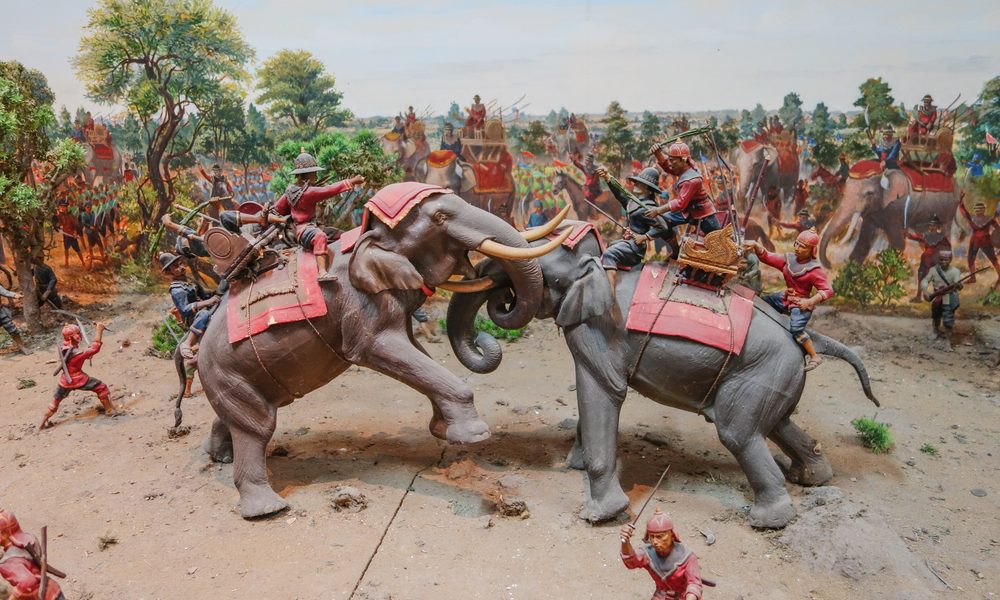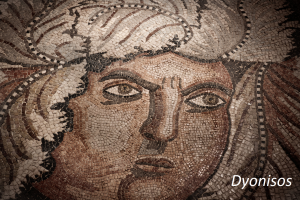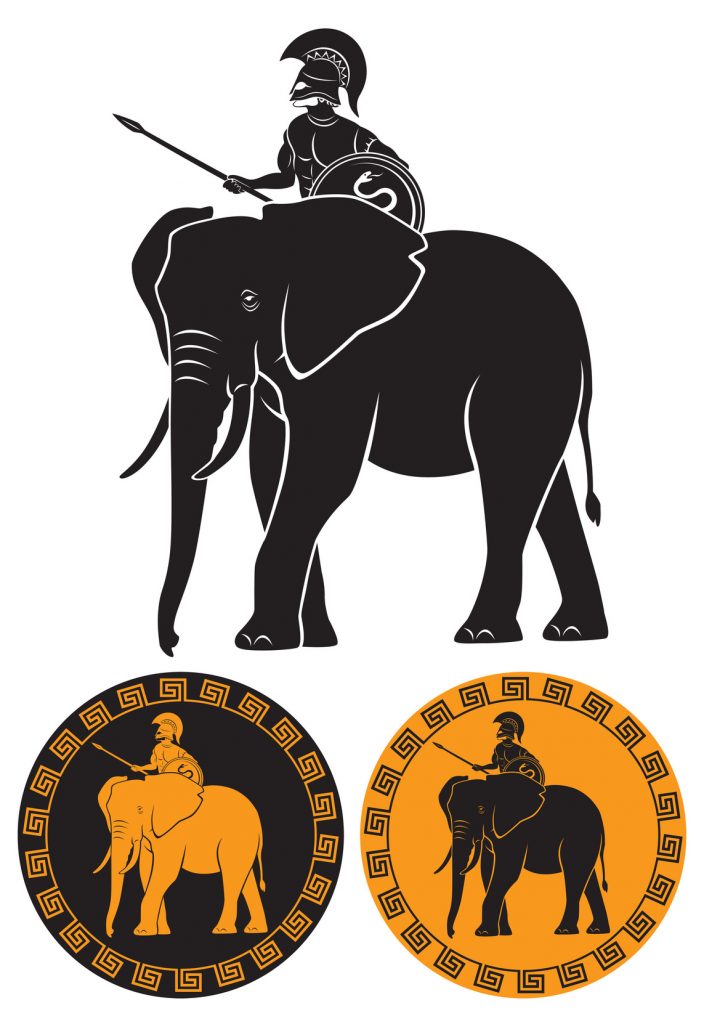
230 BC to 210 BC, Psalm 36: The hippodrome.
This site was first built in French (see www.147thgeneration.net). The English translation was mainly done using « google translation ». We have tried to correct the result of this translation to avoid interpretation errors. However, it is likely that there are unsatisfactory translations, do not hesitate to communicate them to us for correction.
(for that click on this paragraph)
Summary
This generation is from the years 230 BC to 210 BC
According to our count, this generation is the 36th generation associated with Psalm 36. It is in this Psalm 36 that we therefore find an illustration of the facts of this generation.
This generation is marked by the reign of King Lagide Ptolemy IV Philopator. During his reign, he again managed to defeat the Seleucids led by Antiochius III in the battle of Raphia.
Ptolemy decided to visit the neighboring cities and encourage them. Among them, Jerusalem. Amazed by the Temple, he wants to enter the Holy of Holies. In response to the prayers of the priests, struck with a sudden paralysis, the king collapsed on the ground in front of the door of the Temple.
Back in Egypt, Philopator decides to take revenge on the Jews. He promulgates a decree which obliges the Jews of Alexandria to sacrifice to Dionysus. The recalcitrant will be branded with the sign of the ivy leaf, emblem of Dionysus. Some of them obeyed, but the vast majority refused. Irritated by this refusal, the king will extend the anti-Jewish measures to the entire diaspora of Egypt. He orders that these recalcitrant jews be sent to Alexandria with women and children to undergo the supreme punishment which is appropriate to the traitors. Their transfer is carried out under inhumane conditions.
The Jews are gathered at a hippodrome near Alexandria where five hundred drunken elephants have to trample on them in order to execute them before Philopator can return to Judea to burn the Temple of Jerusalem. In response to the prayer of Eleazar, an old man from a priestly family, the elephants turn against the armed soldiers who follow them and begin to trample them.
The king’s fury suddenly turns to pity and he returns to normal relations with the Jews in his kingdom.
Talk
Ptolemy IV Philopator
This generation is marked by the reign of King Lagide Ptolemy IV Philopator (221 BC, 205 BC). During his reign, he again managed to defeat the Seleucids led by Antiochius III in the battle of Raphia (217 BC). Among the texts relating to this period we can quote the apocryphal texts (for the old and the New Testament) III Maccabees.
Following his victory at Raphia, Ptolemy IV Philopator finds himself in Jerusalem:
- Having [1] vanquished this attempt (- a [2] character named Theodotus had tried to murder him –), the king (Ptolémée IV Philopator) then decided to proceed to the neighbouring cities, and encourage them.
- By doing this, and by making donations to their temples, he inspired his subjects with confidence.
- The Jews sent some of their council and of their elders to him. The greetings, guest- gifts, and congratulations of the past, bestowed by them, filled him with the greater eagerness to visit their city.
- Having arrived at Jerusalem, sacrificed, and offered thank-offerings to the Greatest God, and done whatever else was suitable to the sanctity of the place, and entered the inner court,
- he was so struck with the magnificence of the place, and so wondered at the orderly arrangements of the temple, that he considered entering the sanctuary itself.And when they told him that this was not permissible, none of the nation, no, nor even the priests in general, but only the supreme high priest of all, and he only once in a year, being allowed to go in, he would by no means give way.
- Then they read the law to him; but he persisted in obtruding himself, exclaiming, that he ought to be allowed: and saying « Be it that they were deprived of this honour, I ought not to be ».
- And he put the question, Why, when he entered all the temples, none of the priests who were present forbad him?He was thoroughly answered by some one, That he did wrong to boast of this.
- Well; since I have done this, said he, be the cause what it may, shall I not enter with or without your consent?
- And when the priests fell down in their sacred vestments imploring the Greatest God to come and help in time of need, and to avert the violence of the fierce aggressor, and when they filled the temple with lamentations and tears.
The wrath of Ptolemy IV
The attitude of Ptolemy IV Philopator against the Jews, who were initially his allies, aggravated by the later attacks that we will describe below is illustrated by the beginning of the Psalm:

- For the conductor. Of the servant of the Lord, of David.
- The word of the transgression to the wicked man, in the midst of my heart, is that there is no fear of God before his eyes.
- For it smoothed the way before him in his eyes, to find his iniquity to hate [him].
- The words of his mouth are iniquity and deceit; he refrained from learning to improve.
- He thinks iniquity on his couch; he stands on a way that is not good; he does not reject evil.
Struck[3] with a sudden paralysis, the impious king collapses on the ground in front of the door of the Temple. Back in Egypt, Philopator decides to take revenge on the Jews. He promulgates a decree engraved on a column near the tower of his palace.
Dionysus

The decree, which seems to be addressed primarily to the Jews of Alexandria, proclaims that none of them will be able to go to the holy places – they are synagogues – if they do not sacrifice to Dionysus. The Jews will be counted to suffer a lapse in their status and will be branded with the sign of the ivy leaf, emblem of Dionysus; however, those who voluntarily accept to adhere to the worship of this god, will be spared and will receive citizenship in Alexandria.
Some of them obeyed, but the vast majority refused.
Irritated by this refusal, the king will extend the anti-Jewish measures to the entire diaspora of Egypt. He can count on the support of some of his subjects who reproach the Jews for their religious particularism. He addresses to the local authorities of the kingdom an order (prostagma) in which, after summarizing the events since his campaign in Asia – a good opportunity to oppose his greatness of soul to the perfidy of the Jews – he orders that these be sent to Alexandria with women and children to undergo the supreme punishment which is appropriate to the traitors.
Punishment of the Jews
Rebel Jews are guilty of preparing a plot against royal power.
Once punished, the king hopes, the kingdom will again enjoy perfect tranquility and a state of prosperity. Whoever hides a Jew, young or old, including infants in their mothers, will be put to death with all his family. Any house in which a hidden Jew is found will be delivered to the flames. On the other hand, those who denounce the guilty will receive two thousand drachmas from the royal treasury and will be able to count on other rewards: Dionysian honors or freedom for the informer if he is a slave:
- Now[4] in every place where this ordinance arrived, a feast at public expense was arranged for the nations with shouts and joy, as if the inveterate enmity which had long ago been in their minds was now made evident with outspokenness.
- But among the Judeans, there was unceasing mourning, and the most-lamentable tearful cries;11 everywhere their heart was on fire by groanings, because of the unexpected destruction which had suddenly been determined for them.
- What district or city, or what habitable place at all, or what streets were not filled with beatings-of-the-breast in lamentation and moanings for them?
- For the generals in the several cities sent them off, all together, with such a pitiless soul of bitterness, that at the sight of their unusual punishments, even some of their enemies, perceiving the common object of mercy before their eyes, calculated the uncertainty of their lifestyle, shedding tears at the most-miserable expulsion of these people.
- For a multitude of gray-headed old men, sluggish, bent-over on their feet, was being led away, forced to march at a swift pace by the violence with which they were driven in such a shameful manner.
- But young-girls who had recently entered the bridal chamber to share a married lifestyle, exchanged delight for moanings, and their myrrh-perfumed hair sprinkled with dust, but were led away in an unveiled-manner, raising with-oneaccord a dirge instead of a wedding-hymn, as they were torn by the crueltreatment of foreigners.
- But enchained and in public view they were violently dragged along as far as the place of embarkation of the boat.
- Also, their husbands, in the prime of youth, their necks encircled with nooses instead of crowns, spent the remaining days of their marriage-festival in a dirge instead of good-cheer and youthful recreation, seeing the Netherworld already lying at their feet.
- But they were brought on board like beasts, driven under the constraint of iron-bonds; indeed some were nailed at the neck to the benches of the boats, but others had their feet secured by unbreakable shackles;
- and in addition, they were confined under a solid deck, so that, with their eyes in total darkness, they would undergo treatment befitting traitors during the whole voyage back.
The elephants
The Jews are gathered at a hippodrome near Alexandria where five hundred drunken elephants have to trample on them in order to execute them before Philopator can return to Judea to burn the Temple of Jerusalem. It was then that an old man named Eleazar, descended from a priestly family, rises from among the Jews gathered to implore the Lord.
This prayer expressing the faith of the Jews in their God even in the most tragic moments is illustrated by the following of the Psalm, where the evocation of the beasts is not without recalling the imminent threat represented by the elephants:

- O Lord, Your kindness is in the heavens; Your faith is until the sky.
- Your charity is like the mighty mountains; Your judgments are [like] the vast deep. You save both man and beast, O Lord.
This prayer does not remain without effect. God intervenes to save the captives of the hippodrome:
- Then[5] the most-glorious, almighty, and true God revealed his holy face and opened the heavenly gates, from which two glorious messengers of fearful-aspect descended, visible to all except the Judeans.
- And they withstood the force of their opponents and filled them with confusion and terror, and bound them with immovable shackles.
- And even the king’s body began to shudder, and he received a forgetfulness of his sullen audacity.
- And the beasts turned back upon the armed forces which were following them, and began trampling and destroying them.
- And the king’s anger was turned to pity and tears because of the things which he had devised beforehand.
Although the text of III Maccabees was presumably written late, and therefore well after the facts cited, it is likely that this text is based on real facts recounted by texts now lost. The facts are surely authentic, the elephants had to turn against their masters, but it is likely that if angels intervened, they remained invisible.
In any case, the nature of the story when the miracle that saved the Jews from extermination and allowed King Philopator to return to normal relations with the Jews of his kingdom is illustrated by the end of the psalm:

- How precious is Your kindness, O God, and the sons of man will take refuge in the shadow of Your wings.
- They will be sated from the fat of Your house, and with the stream of Your delights You give them to drink.
- For with You is the source of life; in Your light we will see light.
- Extend Your kindness to those who know You, and Your charity to the upright of heart.
- Let the foot of haughtiness not come with me, neither shall the hand of the wicked cause me to wander.
- There the workers of iniquity have fallen; they have been thrust away and were unable to rise.

[1] MACCABEES III, Chapitre 1, versets 6 à 16
[2] See III Maccabees, Chapter 1, verses 2 and 3
[3] To summarize the rest of the Third Book of the Maccabees we refer to the summary made by J Mélèze Modrzejewski in « The Jews of Egypt from Ramses II to Hadrian », Chapter « The Zenith: Egypt of the Lagides / The sources of anti-Semitism pagan ”. (french reference : « Les Juifs d’Egypte de Ramsès II à Hadrien », Chapitre « Le Zénith : l’Egypte des Lagides/Aux sources de l’antisémitisme païen »)
[4] THIRD MACCABEES, chapter 4, verses 1 to 12 (translation from website : http://www.biblicalaudio.com/maccabees3.htm)
[5] THIRD MACCABEES, chapter 6, verses 18 to 22 (translation from website : http://www.biblicalaudio.com/maccabees3.htm)

